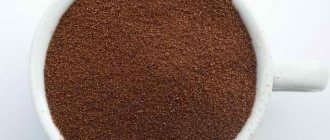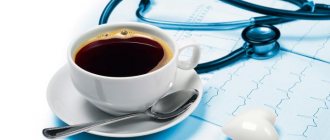Caffeine and its artificial analogue (sodium benzoate, preservative E-211), used in the food industry, can cause deterioration in health. With regular and excessive consumption of coffee drinks and products containing caffeine (for example, energy drinks), there is a high probability of developing pathologies of the gastrointestinal tract, central nervous system and cardiovascular system.
Long-term consumption of coffee is the cause of gastritis, colitis, stomach ulcers, hypertension, as well as some neurological and mild mental disorders. Therefore, depending on the consequences of excessive coffee consumption, a cardiologist, gastroenterologist, neurologist, neuropsychiatrist or psychotherapist may be involved in the treatment of caffeine addiction.
In the absence of somatic pathology, treatment for caffeine addiction in our clinic is carried out by psychotherapists or hypnologists. On the recommendation of a doctor, the course of treatment can be supplemented with sessions of relaxation therapy, therapeutic massage or acupuncture.
People who abuse coffee often experience some of the symptoms of caffeine overdose: insomnia, frequent headaches, dizziness, nervousness, mild excitability and increased anxiety.
Symptoms of caffeine overdose
Unfortunately, drinking coffee has become a habitual ritual for many. In an attempt to get themselves into working condition as quickly as possible, people turn to coffee almost immediately after sleep. However, the negative consequences of such a habit will not be long in coming.
Often the symptoms of a caffeine overdose are perceived by people as negative consequences of daily stress, anxiety and an unsettled lifestyle:
- insomnia;
- depression;
- nervousness and irritability;
- increased anxiety.
To a lesser extent, symptoms of caffeine overdose include frequent urination (enuresis), fluctuations in blood pressure, increased body temperature, heartburn, nausea, diarrhea, deterioration of the skin (caused by dehydration), vision problems and dizziness.
Caffeine-containing drinks are recommended to be consumed with caution by people with increased nervous excitability, cardiac arrhythmia, peptic ulcer, gastritis, atherosclerosis and glaucoma.
Rice. 1. Caffeine content in coffee and tea.
How to quickly remove caffeine from the body?
In most cases of mild poisoning, unpleasant symptoms disappear after a day. However, serious overdoses require treatment. If signs of caffeine intoxication are detected, first aid must be provided to the victim.
What to do:
- Rinse the stomach. The victim needs to drink a large amount of water and induce vomiting.
- They give sorbents. Medicines help speed up the removal of toxins from the body. It is allowed to take activated carbon, Polysorb, Smecta, Enterosgel.
- They give you a lot to drink. Drinking more water will help you avoid dehydration and quickly rid your body of toxic compounds. It is permissible to use the medicinal solution Regidron.
- They offer bananas. This fruit contains an increased amount of potassium and helps restore the normal state of the body.
- Provide access to fresh air. It is recommended to ventilate the room and open the windows.
If symptoms of caffeine poisoning persist, it is recommended to seek medical attention. This will help avoid negative consequences.
What to do if you overdose on caffeine
People who lead a hectic lifestyle and have health problems are more susceptible to symptoms of caffeine overdose. If you feel unwell (for example, with a sharp increase in blood pressure, high heart rate and dizziness) due to excessive consumption of caffeine-containing drinks, you must provide first aid and call a doctor.
To avoid possible death, you need to know what to do if you overdose on caffeine. We also advise you not to neglect calling a doctor, since at first glance, a slight deterioration in health may be a signal of a serious disruption in the functioning of the cardiovascular system.
Treatment of caffeine overdose
If possible, have someone nearby and follow the guidelines for treating caffeine overdose until doctors arrive:
- loosen your tie and/or belt;
- loosen tight clothing;
- open a window or go out into the fresh air;
- drink clean water until completely saturated;
- do not hold back your gag reflex.
Further treatment of caffeine overdose will be carried out by doctors. If the current state of health upon examination raises concerns among physicians, treatment of caffeine overdose will need to be performed in a medical facility. It may include gastric lavage, intravenous administration of magnesium sulfate, diprazine and morphine hydrochloride, as well as drugs to reduce agitation and normalize the functioning of internal organs. In severe cases, plasma substitutes are used to treat caffeine overdose.
Rice. 2. The ratio of patients with pathology of the cardiovascular system per 100 thousand population in the Russian Federation (according to Rosstat).
The benefits and harms of caffeine for humans
There are different opinions about the dangers and benefits of caffeine. Many consider it necessary for the body, others argue that the substance has a negative effect on the body. What are the beneficial properties of caffeine? Actions:
- improves brain function, increases physical activity;
- helps get rid of drowsiness and fatigue;
- increases blood pressure, useful for hypotensive patients;
- speeds up metabolism;
- normalizes the synthesis of gastric juice;
- stimulates intestinal peristalsis;
- reduces the risk of developing diabetes;
- improves metabolism;
- helps get rid of pain during migraine conditions.
You will like the article: “ The benefits and harms of coffee for the human body – natural or instant? ".
However, despite the benefits of caffeine, it is not recommended to abuse products containing the substance. What harm can the compound cause to humans?
Harm of caffeine:
- heart rhythm disturbance;
- dehydration;
- negative effect on the stomach and adrenal glands;
- negative effect on bones;
- the appearance of heartburn;
- exhaustion of the nervous system.
We recommend: Overdose and tea poisoning - symptoms, treatment methods
Caffeine interferes with the absorption of vitamins and minerals. Frequent use is addictive. How much caffeine is allowed to be consumed so as not to harm the body?
A safe dosage is considered to be no more than 400 mg per day. That's about six cups of coffee. The amount of allowed black tea is four glasses, green tea – five. In some cases, it is recommended to avoid caffeine-containing products. There are several contraindications.
Contraindications when taking caffeine:
- diseases of the cardiovascular system;
- pregnancy;
- ulcerative and other stomach diseases;
- impaired visual functions;
- atherosclerosis;
- cholelithiasis;
- diabetes.
If you have such pathologies, it is recommended to give up coffee. If you have high blood pressure, drink the drink with caution.
Effect of caffeine on the body
Adenosine receptors in the brain are responsible for suppressing excitation. The ability to block adenosine receptors is the main property of caffeine (the caffeine molecule is similar to adenosine), which determines its invigorating effect. In turn, the breakdown of glycogen under the influence of caffeine molecules helps to release additional energy by raising blood sugar levels. In addition, caffeine also increases the concentration of leptin in the blood, which reduces appetite and increases energy expenditure.
The invigorating effect of caffeine directly depends on its amount. Small doses of caffeine are found in tea (up to 45 mg per cup) and instant coffee (up to 70 mg per serving); roasted beans are more saturated with caffeine (up to 115 mg per serving). Separately, it is worth noting energy drinks, the caffeine content of which can reach 250 mg per can. Thus, excessive consumption of energy drinks poses an increased risk of developing cardiovascular diseases, gastrointestinal diseases, and in some cases leads to premature death (cardiac arrest).
Relatively safe dosage of caffeine
Russian regulatory authorities have established a recommendation for daily caffeine consumption. A relatively safe dosage in our country is considered to be the total number of caffeine-containing drinks consumed, not exceeding a total daily dosage of 150–300 mg of caffeine: in terms of cups of tea - no more than 5, per serving of coffee - no more than 3. In the European Union, the EFSA has established a maximum The permissible daily dosage of caffeine is 400 mg, and the maximum single dose is 200 mg.
The effect of caffeine on the female body
The female body is most sensitive to caffeine overdose. Against the background of coffee and energy drink abuse, women have an increased risk of developing breast cancer and osteoporosis, and during pregnancy, a decrease in blood flow to the placenta, increased heart rate in the fetus, premature birth and miscarriage.
Regularly exceeding the recommended dosage inevitably leads to caffeine overdose, the risk of somatic and mental illnesses, and in some cases, psychological dependence on caffeine.
Share
Share
How much caffeine is enough to cause poisoning?
The lethal dosage is 10 g of caffeine per day. This amount is present in 100–150 cups of coffee. The toxic dosage differs depending on the individual's condition.
You will like the article: “ Lethal dose of coffee for humans: in cups, spoons .”
Some people are intolerant to caffeine, so consuming even a small amount can lead to intoxication.
How does caffeine-induced poisoning manifest?
Symptoms of caffeine overdose:
- blood pressure rises;
- the skin acquires a red tint due to increased blood flow;
- headache occurs, tinnitus is possible;
- the respiratory process is disrupted;
- heart rate increases;
- pain occurs in the heart area, the rhythm is disturbed;
- arms and legs weaken, tremors are present, convulsive manifestations may appear;
- the patient becomes restless, irritable;
- disruptions in the functioning of the digestive system occur;
- sleep is disturbed, insomnia is present.
A person who has suffered from an overdose has a disturbance in the flow of thoughts and does not feel tired for a long time. With prolonged overdose, the patient experiences nausea, possible vomiting, and disruption of the digestive process. Severe poisoning is accompanied by hallucinations and blue discoloration of the skin.
Intoxication caused by caffeine is included in the International Classification of Diseases and has an ICD-10 code - T43.8 - Poisoning with other psychotropic drugs not classified elsewhere.
We recommend: Fruits in case of poisoning: is it possible or not?
When is first aid needed for an overdose?
First aid helps to cope with mild manifestations of poisoning. If unpleasant symptoms persist, then you need to visit a medical facility. In what cases is the help of doctors required? Occasions:
- loss of consciousness;
- presence of hallucinations, cyanosis;
- convulsive manifestations;
- deterioration of condition;
- sudden pressure surges.
If you have such symptoms, a visit to the hospital is mandatory. If left untreated, serious complications may develop.
Consequences and prevention
In case of mild poisoning, a person recovers quite quickly. However, severe and chronic caffeine intoxication often causes serious complications. What consequences are possible with such overdoses?
Consequences of coffee poisoning:
- disruption of the cardiac system;
- epileptic seizures;
- increased risk of heart attacks and strokes;
- development of heart muscle failure.
Preventing poisoning is not difficult. It is necessary to limit coffee consumption and replace it with other drinks: tea, chicory, freshly squeezed juices. Products containing harmful compounds are recommended to be consumed in moderation. You should not give coffee to children; the drink is more dangerous for them than for adults.
You will like the article: “ What to do if you overdose on coffee .”
Caffeine intoxication occurs when you abuse products containing this substance. If unpleasant signs appear, you need to stop eating such dishes and seek help from medical professionals.










